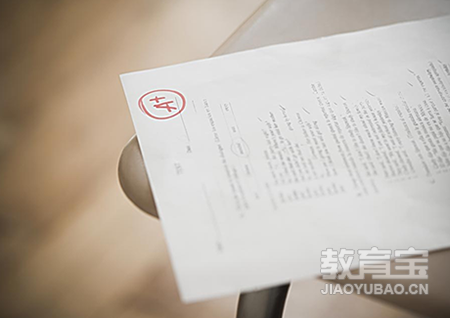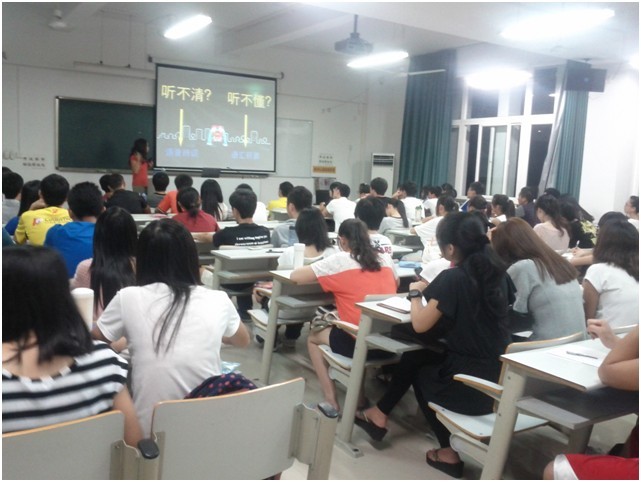 返回
教育头条
返回
教育头条

英语四级阅读之倒装句 英语六级考试
在英语四级阅读考试中,倒装句是经常出现的,如果搞不懂的话,会浪费很多时间!今天就和小编一起了解一下倒装句的知识吧!
主语和谓语有两种顺序:一是主语在前,叫自然语序。反之,如果谓语在主语前就是倒装语序,又分全部倒装和部分倒装。全部倒装是把全部谓语放在主语之前,部分倒装是把助动词或情态动词放在主语之前。
(一)全部倒装
1.there be 句型:可以用在这类句型中的动词除be外,还可用live,happen,exist,remain,stand等等作这类句型的谓语。如:
There are many students in the classroom.
教室里有许多学生。
Long,long ago there lived a king who loved horses very much.
很久很久以前,有一位国王,他非常喜欢马。
There happened to be nobody in the bedroom when the fire broke out.
起火的时候,碰巧房间里面没有人。
2.Here/There/Now/then+vi.(常为come,go)+主语(必须是名词)
Here comes Mary. → I can see Mary coming.玛丽来了。
There goes the bell. 铃响了。→I can hear the bell ringing.
Then came a new difficulty. 然后产生了一个新的困难。
3.out,in,up,down,away之类的副词作状语放在句首,主语比较长,也就是说主语不能是很短的人称代词,谓语为不及物动词come,go,run ,rush,etc。句式为:副词+vi.+主语(必须是名词)。如:
Out rushed the tiger from among the bushes.老虎从灌木丛里冲了出来。
In came the rose fragrance through the windows.玫瑰花香透过窗户飘了进来。
4.介词短语作状语放在句首,谓语为不及物动词,主语比较长,也就是说主语不能是很短的人称代词。句式为:介词短语+vi.+主语(必须是名词)。如:
In the middle of our school stands a high building.在学校中央有一座高楼。
5.表语放在句首,表语常为形容词、分词、副词、介词短语。要求主语比较长,也就是说主语不能是很短的人称代词。句式为:表语+系动词+主语(必须是名词)。
Gone are the days when the teachers were looked down upon.
老师地位低下的年代一去不复返了。
On the both sides of the street are beautiful flowers.街道两旁有美丽的花。
South of city are two big lakes.城市的两边有两个大湖。
(二)、部分倒装
1.“only+副词/介词短语/ 状语从句”开头的句子。如:
Only then did I realize the importance of English.
直到那时我才意识到英语的重要性。
Only in this way can you make progress in your English.
只有通过这种方式你学英语才会取得进步。
2.否定词(短语)开头的句子要用部分倒装。
表示否定的副词never,nor,neither,表示半否定意义的副词hardly,few,seldom,little,含有no和not的词组by no means(决不),in no time(很快),at no time(在任何时候都不),(在任何情况下都不)not until,not only...but also,no sooner...than=hardly...when/scarcely...
when。即“否定词+助动词/情态动词+主语+其他”。如:
Never have I been in this city.我从没到过这座城市。
Little/Seldom do I watch TV.我很少看电视。
Not until I began to work did I realize how much time I had wasted.
直到我参加了工作我才意识到我浪费了多少时间。
3.以so开头,用“so+助动词/情态动词/系动词+主语”表示前面叙述的情况也适合于另一个人或物,意为“也,同样,也如此”。表示前面叙述的否定情况也适合于另一个人或物,用“neither/nor+助动词/情态动词/系动词+主语”。
Society has changed and so have the people in it.社会变了,人也变了。
注意:
1)当so表示对前句内容的肯定、符合,或进一步强调前面所说的情况,或者赞同前面的说法时,应用自然语序。意为“的确,正是”。
—Tom works hard.汤姆工作很卖力。
—So he does and so do you.的确如此,你也是。
2)倒装部分的助动词、情态动词、连系动词的时态和形式要与前句相一致。
If you don’t go,neither/nor shall I.(If you don’t go,I shall not go.)你不去,我也不去。
注意:表示前面的多种情况也适合于另一人或物,或者既有肯定又有否定情况或涉及到不同类型的动词时可用:It is the same with sth./sb.或So it is with sth./sb.句型。
She does well in English,but is poor in maths.So it is with Lucy.
她英语学得好,但数学学的差,露茜也是如此。
4.由as引导让步状语从句要用部分倒装或前置。句式为:表语/状语/动词原形+as+主语+其他。如:
Clever as he is,he doesn’t study well.虽然他很聪明,但他学习不好。
Child as he is, he knows a lot.虽然他是个孩子,但他懂得不少事情。
Much as I like it,I won’t buy it.虽然我非常喜欢它,但我不买。
Try as she might, she failed.虽然她试过了,但还是失败了。
注意:表语前的名词无形容词修饰时冠词要省略
5.在so...that从句中,如果so+adj./adv.放在句首,其主句要倒装。
So loudly did he speak that everyone could hear him.
他讲话声音足够大,以至于每个人都能听得见。

6.如果虚拟条件句的谓语含有were,should,were可以把if省略而将这三个词放于条件句主语前构成倒装。
If it hadn’t been for their help,we couldn’t have finished the work on time.
=Hadn’t it been for their help,we couldn’t have finished the work on time.
要不是由于他们的帮助,我们不可能按时完成那项工作。
If there should be a flood,what would we do?
=Should there be a flood,what would we do?
要是发了洪水,我们该怎么办呢?
7.频度副词及短语often,always,nowand then ,many a time ,everyother day等放在句首时有时也倒装。
Many a time has he come to comfort me.他来安慰了我好多次。
Often did he warn them not to do so.他经常告诫他们不要那样去做。
8.某些表示祝愿句子也用倒装语序。
May you succeed.祝你成功!
主语和谓语有两种顺序:一是主语在前,叫自然语序。反之,如果谓语在主语前就是倒装语序,又分全部倒装和部分倒装。全部倒装是把全部谓语放在主语之前,部分倒装是把助动词或情态动词放在主语之前。
(一)全部倒装
1.there be 句型:可以用在这类句型中的动词除be外,还可用live,happen,exist,remain,stand等等作这类句型的谓语。如:
There are many students in the classroom.
教室里有许多学生。
Long,long ago there lived a king who loved horses very much.
很久很久以前,有一位国王,他非常喜欢马。
There happened to be nobody in the bedroom when the fire broke out.
起火的时候,碰巧房间里面没有人。
2.Here/There/Now/then+vi.(常为come,go)+主语(必须是名词)
Here comes Mary. → I can see Mary coming.玛丽来了。
There goes the bell. 铃响了。→I can hear the bell ringing.
Then came a new difficulty. 然后产生了一个新的困难。
3.out,in,up,down,away之类的副词作状语放在句首,主语比较长,也就是说主语不能是很短的人称代词,谓语为不及物动词come,go,run ,rush,etc。句式为:副词+vi.+主语(必须是名词)。如:
Out rushed the tiger from among the bushes.老虎从灌木丛里冲了出来。
In came the rose fragrance through the windows.玫瑰花香透过窗户飘了进来。
4.介词短语作状语放在句首,谓语为不及物动词,主语比较长,也就是说主语不能是很短的人称代词。句式为:介词短语+vi.+主语(必须是名词)。如:
In the middle of our school stands a high building.在学校中央有一座高楼。
5.表语放在句首,表语常为形容词、分词、副词、介词短语。要求主语比较长,也就是说主语不能是很短的人称代词。句式为:表语+系动词+主语(必须是名词)。
Gone are the days when the teachers were looked down upon.
老师地位低下的年代一去不复返了。
On the both sides of the street are beautiful flowers.街道两旁有美丽的花。
South of city are two big lakes.城市的两边有两个大湖。
(二)、部分倒装
1.“only+副词/介词短语/ 状语从句”开头的句子。如:
Only then did I realize the importance of English.
直到那时我才意识到英语的重要性。
Only in this way can you make progress in your English.
只有通过这种方式你学英语才会取得进步。
2.否定词(短语)开头的句子要用部分倒装。
表示否定的副词never,nor,neither,表示半否定意义的副词hardly,few,seldom,little,含有no和not的词组by no means(决不),in no time(很快),at no time(在任何时候都不),(在任何情况下都不)not until,not only...but also,no sooner...than=hardly...when/scarcely...
when。即“否定词+助动词/情态动词+主语+其他”。如:
Never have I been in this city.我从没到过这座城市。
Little/Seldom do I watch TV.我很少看电视。
Not until I began to work did I realize how much time I had wasted.
直到我参加了工作我才意识到我浪费了多少时间。
3.以so开头,用“so+助动词/情态动词/系动词+主语”表示前面叙述的情况也适合于另一个人或物,意为“也,同样,也如此”。表示前面叙述的否定情况也适合于另一个人或物,用“neither/nor+助动词/情态动词/系动词+主语”。
Society has changed and so have the people in it.社会变了,人也变了。
注意:
1)当so表示对前句内容的肯定、符合,或进一步强调前面所说的情况,或者赞同前面的说法时,应用自然语序。意为“的确,正是”。
—Tom works hard.汤姆工作很卖力。
—So he does and so do you.的确如此,你也是。
2)倒装部分的助动词、情态动词、连系动词的时态和形式要与前句相一致。
If you don’t go,neither/nor shall I.(If you don’t go,I shall not go.)你不去,我也不去。
注意:表示前面的多种情况也适合于另一人或物,或者既有肯定又有否定情况或涉及到不同类型的动词时可用:It is the same with sth./sb.或So it is with sth./sb.句型。
She does well in English,but is poor in maths.So it is with Lucy.
她英语学得好,但数学学的差,露茜也是如此。
4.由as引导让步状语从句要用部分倒装或前置。句式为:表语/状语/动词原形+as+主语+其他。如:
Clever as he is,he doesn’t study well.虽然他很聪明,但他学习不好。
Child as he is, he knows a lot.虽然他是个孩子,但他懂得不少事情。
Much as I like it,I won’t buy it.虽然我非常喜欢它,但我不买。
Try as she might, she failed.虽然她试过了,但还是失败了。
注意:表语前的名词无形容词修饰时冠词要省略
5.在so...that从句中,如果so+adj./adv.放在句首,其主句要倒装。
So loudly did he speak that everyone could hear him.
他讲话声音足够大,以至于每个人都能听得见。

6.如果虚拟条件句的谓语含有were,should,were可以把if省略而将这三个词放于条件句主语前构成倒装。
If it hadn’t been for their help,we couldn’t have finished the work on time.
=Hadn’t it been for their help,we couldn’t have finished the work on time.
要不是由于他们的帮助,我们不可能按时完成那项工作。
If there should be a flood,what would we do?
=Should there be a flood,what would we do?
要是发了洪水,我们该怎么办呢?
7.频度副词及短语often,always,nowand then ,many a time ,everyother day等放在句首时有时也倒装。
Many a time has he come to comfort me.他来安慰了我好多次。
Often did he warn them not to do so.他经常告诫他们不要那样去做。
8.某些表示祝愿句子也用倒装语序。
May you succeed.祝你成功!
好了,就说这么多,希望对大家有用。我是你的学习顾问王敏,选课有问题,快来找行家,我会为你匹配最适的课程,欢迎大家关注我微信(18560125702),学姐近10年教培行业工作经验,从现在开始我就是你的私人顾问,为您的课程进行一个详细系统的讲解哦。返回教育宝头条
【免责声明】本文仅代表作者本人观点,与教育宝无关。教育宝对文中陈述、观点判断保持中立,不对所包含内容的准确性、可靠性或完整性提供任何保证。请读者仅作参考,特此声明!





